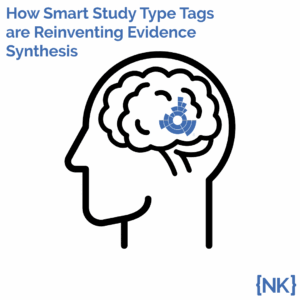
How Smart Study Type Tags Are Reinventing Evidence Synthesis
One of the features of Core Smart Tags is Smart Study Type – this refers to our AI system that automatically categorises the study type

In the ever-evolving field of stroke research, new questions about different therapies, trial outcomes, and even metrics of procedural success are constantly emerging, meaning that systematic reviews are needed on a consistent basis to extract all information needed to inform both patient care and future research. In these projects, because of the major decisions that may result from the findings and because of how busy stroke physicians are, the efficiency and accuracy are paramount.
Recently, we sat down for a conversation with Dr. Yasmin Aziz, a practicing neurologist and Assistant Professor in the Neurology and Rehabilitation Medicine Department at the University of Cincinnati (UC) Gardner Neuroscience Institute. She shared her experience using Nested Knowledge to conduct two projects:
Aziz and her team have made these reviews available to the physician and trialist communities, all while balancing her work as a full time physician. Her journey highlights not only significant findings in stroke treatment but also how innovative software can transform the research process. See below for a summary of As projects!
The Challenge
Endovascular thrombectomy (EVT) has revolutionized the treatment of acute ischemic stroke caused by large vessel occlusions. A key outcome that physicians track conventionally is symptomatic intracerebral hemorrhage (ICH), which can lead to patient morbidity and mortality. However, the occurrence of asymptomatic ICH post-procedure is both under-researched and under-reported in trials. Does this asymptomatic bleeding impact patient outcomes?
The Research
Dr. Aziz, along with her colleague Dr. Pablo Harker embarked on a systematic review and meta-analysis to explore this critical question. Utilizing Nested Knowledge, they sifted through a vast array of studies, focusing on those that reported on asymptomatic ICH after EVT.
Findings
The study revealed that asymptomatic ICH is not as benign as previously thought. Patients exhibiting this condition post-EVT showed worse functional outcomes and higher mortality rates—notably, patients with asymptomatic ICH had over double the odds of worsened neurological outcomes. This insight underscores the need for better detection, tracking, and reporting of asymptomatic ICH for both patients and trials, as well as potentially refining EVT techniques to minimize even asymptomatic bleeding.
How Nested Knowledge Helped
Read The Published Work
You can find Dr. Aziz’s published paper here.
The Challenge
Clinical trials are essential for advancing stroke treatment, yet many fail to reach completion. Dr. Aziz, alongside renowned neurologist and Director of the UC Gardner Neuroscience Institute Dr. Joe Broderick, sought to understand why a significant number of acute stroke trials terminate prematurely.
The Research
Focusing on randomized controlled trials (RCTs) involving acute ischemic or hemorrhagic strokes with over 100 patients, Dr. Aziz conducted a comprehensive analysis using Nested Knowledge. They examined various factors, including trial design, funding sources, and patient demographics.
Findings
The analysis revealed that nearly half of the trials were prematurely terminated. Key reasons included:
How Nested Knowledge Helped
Read The Published Work
You can find Dr. Aziz’s published paper here.
Dr. Aziz’s experiences highlight the transformative power of Nested Knowledge in conducting rigorous and efficient systematic reviews and meta-analyses.
In a field where time is brain, as Dr. Aziz aptly puts it, having the right tools is crucial. Nested Knowledge not only accelerates the research process but can also help enhance the quality and impact of the findings.
For academics and researchers aiming to make significant strides in their fields, Nested Knowledge offers an unparalleled platform to conduct systematic literature reviews with confidence and efficiency.
Yep, you read that right. We started making software for conducting systematic reviews because we like doing systematic reviews. And we bet you do too.
If you do, check out this featured post and come back often! We post all the time about best practices, new software features, and upcoming collaborations (that you can join!).
Better yet, subscribe to our blog, and get each new post straight to your inbox.

One of the features of Core Smart Tags is Smart Study Type – this refers to our AI system that automatically categorises the study type